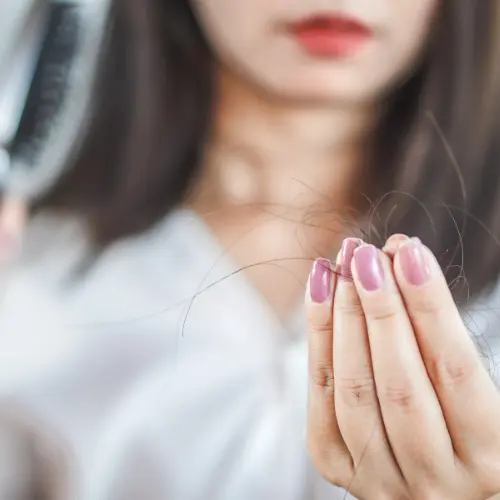Hair fall is a common problem that affects both men and women. It can be caused by a range of factors, from genetics and hormonal imbalances to stress and poor hair care. The sight of strands of hair on the pillow or in the shower can be distressing, but the good news is that there are steps you can take to prevent it. This post will explore the causes of hair fall, and provide you with natural and effective methods to promote hair growth and achieve healthy, luscious locks.
Understanding the Causes of Hair Fall
Hair fall can be caused by a range of factors, including genetics, hormonal imbalances, stress, poor nutrition, and harsh hair care products. Let’s take a closer look at each of these causes.
- Genetics: Some people are more prone to hair fall due to genetics. If your family has a history of hair loss, you may be more likely to experience it as well.
- Hormonal Imbalances: Hormonal changes, such as those experienced during menopause or pregnancy, can also cause hair fall. Additionally, hormonal imbalances, such as those caused by thyroid issues, can also lead to hair loss.
- Stress: Stress can cause hair fall by altering the normal hair growth cycle. When you’re under stress, your body goes into survival mode, and hair growth slows down or stops altogether.
- Poor Nutrition: A diet lacking in essential nutrients, such as iron and biotin, can also contribute to hair fall. Eating a balanced diet that includes a variety of nutrient-rich foods is crucial for promoting healthy hair growth.
- Harsh Hair Care Products: The use of harsh hair care products, such as those containing sulfates and alcohol, can strip the hair of its natural oils, leading to dryness and breakage.
How to Stop Hair Fall and Promote Hair Growth
There are several natural and effective non-surgical solutions you can use to stop hair fall and promote hair growth. Let’s take a closer look at some of the most effective strategies.
- Nourish Your Scalp: Keeping your scalp healthy is crucial for promoting hair growth. You can do this by regularly massaging your scalp with a mixture of coconut oil and castor oil, or by using a hair growth serum that contains nourishing ingredients, such as biotin and niacin.
- Eat a Nutrient-Rich Diet: Eating a diet that is rich in essential nutrients, such as iron, biotin, and vitamins A and C, can help to promote hair growth and prevent hair fall. Some of the best foods for promoting hair health include leafy greens, nuts, and fish.
- Reduce Stress: Reducing stress can help to prevent hair fall by reducing the negative impact it has on your hair growth cycle. Some effective stress-management techniques include exercise, yoga, and mindfulness meditation.
- Avoid Harsh Hair Care Products: Using gentle, sulfate-free hair care products can help to protect your hair from damage and breakage. Look for products that are specifically formulated for dry, damaged, or color-treated hair.
- Consider Supplements: If your diet is lacking in essential nutrients, you may consider taking supplements to support hair growth. Biotin and iron supplements are both commonly recommended for promoting healthy hair growth.
- Minoxidil: Minoxidil is a topical solution that is applied directly to the scalp. It is the active ingredient in several over-the-counter hair loss treatments, including Rogaine. Minoxidil works by increasing blood flow to the hair follicles, which helps to promote hair growth.
- Finasteride: Finasteride is a prescription medication that is taken orally. It is the active ingredient in Propecia, a popular hair loss treatment. Finasteride works by blocking the production of dihydrotestosterone (DHT), a hormone that is known to cause hair loss. By reducing the amount of DHT in the scalp, Finasteride helps to slow down hair loss and promote hair growth.
- Low-level laser therapy is a non-invasive hair loss treatment that uses low-level lasers to stimulate hair growth. The therapy works by delivering low-level laser light to the scalp, which is absorbed by the hair follicles. This stimulates the production of ATP (adenosine triphosphate), the primary energy source for cells. The increased energy production leads to an increase in blood flow to the hair follicles, which delivers essential nutrients and oxygen to the hair follicles.
- PRP: Platelet-rich plasma (PRP) therapy is a medical treatment that uses the patient’s own blood plasma to slow down hair loss. The therapy works by harvesting a patient’s own blood, and then processing it to concentrate the platelets, which are rich in growth factors. The resulting PRP solution is then injected into the scalp, where it delivers high concentrations of growth factors directly to the hair follicles.
In summary, non-surgical hair loss solutions, such as nourishing your scalp, reducing stress, minoxidil, PRP therapy, and others listed can be effective in slowing down hair loss and promoting hair growth. However, it is important to note that these treatments are not a cure for hair loss, and results may vary from person to person. If non-surgical hair loss solutions fail to provide desired results, it may be necessary to consider surgical options such as hair transplantation.
Hair transplantation is a surgical procedure that involves transplanting hair follicles from a donor area to a recipient area on the scalp. The procedure is performed by a skilled hair transplant surgeon and can produce natural-looking results. However, it is important to carefully consider all the risks and benefits of hair transplantation and to choose a qualified and experienced hair transplant surgeon.
If you are experiencing hair loss and are unsure of which treatment option is best for you, it is recommended that you consult with a Toronto Hair Transplant Surgeon. They can help you determine the best course of action for your specific situation and help you achieve the best possible outcome for your hair loss concerns.




